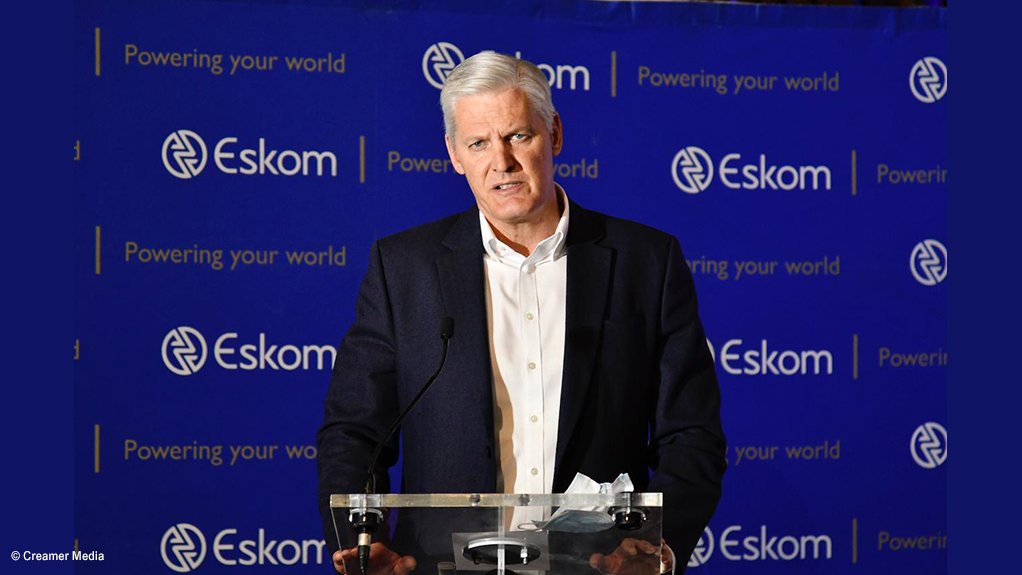Special Investigating Unit (SIU) head Advocate Andy Mothibi says the fact that former Eskom CEO André de Ruyter did not receive board authorisation to commission a private intelligence investigation into criminality and sabotage at the State-owned utility raises potentially grave governance issues. Nevertheless, he stresses that the report’s content “cannot be ignored” and is proving useful in guiding several ongoing investigations.
In a presentation to the Standing Committee on Public Accounts (Scopa), Mothibi confirmed that George Fivaz Forensics and Risk (GFFR) had been appointed by Business Leadership South Africa (BLSA) to conduct the probe in a contract facilitated by De Ruyter, who “was acting on his own”.
The private investigation reportedly cost R50-million and was funded by BLSA together with as yet unnamed private funders, with the BLSA’s portion valued at R17.1-million before value added tax.
Mothibi said that, while De Ruyter might have been acting with good intentions, undertaking a private investigation into a State institution without the necessary authority points to possible “maladministration”.
“Consideration should be given to holding the former GCEO to account,” he told lawmakers, while suggesting that BLSA ought to have known that it could not conduct an investigation at a State institution without the necessary authority.
BLSA CEO Busi Mavuso, who was said to have been cooperating with the SIU enquiries, has previously defended the decision to part-fund the investigation on the basis of businesses’ desire to support the combating of crime and corruption at Eskom, which was posing a major risk to ongoing business operations and investment.
BLSA also insisted that it had no role in the appointment of GFFR, nor in vetting the lead investigator Tony Oosthuizen, who has been identified in media reports as having been an apartheid military intelligence operative.
However, the SIU obtained a copy of the contract between GFFR and BLSA which was concluded on January 28, 2022, and reported that a close-out report was issued to BLSA in August 2023.
No specific recommendation was immediately provided regarding what action should be taken against either De Ruyter or BLSA, with Mothibi indicating that it planned to make such a recommendation only once various further enquires had been completed.
For instance, De Ruyter’s employment contract still required analysis to assess whether it empowered him to undertake such an investigation without the approval of the board and the knowledge of law enforcement authorities. A scenario described as highly unlikely in light of the legislative and regulatory framework surrounding the initiation of such actions.
De Ruyter left Eskom in February after an explosive television interview in which he revealed that he had been poisoned and implicated senior politicians in widespread crime, corruption and sabotage at the utility; information which appeared to be drawn directly from the GFFR report.
Mothibi denied that pursuing De Ruyter amounted to the “proverbial shooting of the messenger”, insisting that the GFFR investigation could set a “concerning precedent” for governance and law enforcement if not addressed.
That said, he also insisted that the SIU and the law-enforcement agencies, which had since had sight of the GFFR document, were not discounting the substance of the report and were actively pursuing several leads.
As with De Ruyter, neither Mothibi nor Lieutenant General Godfrey Lebeya of the Hawks, who also made a presentation to Scopa, would be drawn on the names of the senior politicians identified in the report as having links to coal cartels in Mpumalanga.
Both confirmed that the GFFR contained names, but Mothibi said he could not reveal the identity without further evidence, while Lebeya said the Hawks only named implicated individuals when they were charged.
USEFULNESS OF REPORT CONFIRMED
Despite the unauthorised nature of the report, its “usefulness” was confirmed, with an SIU analysis indicating that the report contained “54 themes” of allegations of a criminal nature, 22 of which fell within the mandate of the SIU, which conducts civil litigation services on behalf of government.
The South African Police Service, meanwhile, told lawmakers that it was preparing to make more than 20 arrests of individuals linked to the coal cartels in the not-too-distant future.
Besides intelligence on the coal cartels and the naming of prominent individuals, the report also includes information about sabotage by contractors seeking to cause damage that would involve emergency repairs involving excessive costs, as well as procurement fraud, particularly relating to the manipulation of coal weighbridges.
The SIU and the Directorate for Priority Crime Investigation, or the Hawks, had also agreed to establish joint operations to secure evidence arising from the intelligence report, with Lebeya confirming that this collaboration would be expanded to include Crime Intelligence, the South African Revenue Service, the Financial Intelligence Centre (FIC), Eskom and the National Prosecuting Authority.
“The SIU has engaged with the FIC and can confirm that a Tactical Operational Team (TOG) has been established.
“The TOG will operate under the provisions of the South African Anti Money Laundering Task Force, which is a private-public partnership initiative to fight money laundering,” Mothibi reported.
The first meeting was held on September 6 and the first cases had been prioritised and investigations had started.
However, the SIU was also probing emergency contracts allegedly placed as a direct result of the GFFR report, including the much-publicised Fidelity Security Contract.
EMAIL THIS ARTICLE SAVE THIS ARTICLE ARTICLE ENQUIRY
To subscribe email subscriptions@creamermedia.co.za or click here
To advertise email advertising@creamermedia.co.za or click here











